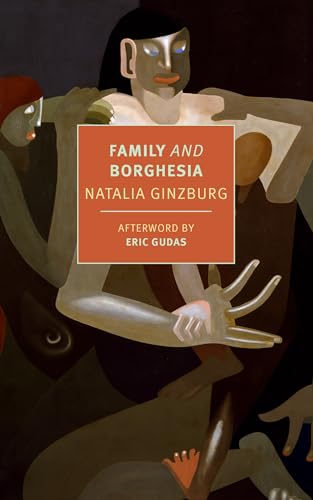
Natalia Ginzburg | Family and Borghesia | New York Review of Books: £11.99
Reviewed by Livi Michael
In Family, the first of the two novellas in this volume, the two protagonists are not named for several pages. We are, however, offered lot of information about them, delivered in short, factual declarations. Much has been made of the cinematic quality of Ginzburg’s style, its neo realism, but the descriptions themselves have a static quality, more like snapshots than moving film. When the protagonist, (who is eventually named Carmine) is introduced to someone’s brother and sister-in-law we are told that:
His brother was small, dishevelled and frail-looking. His sister-in-lawhad a huge head of blonde curls and a face like a doll. He was called Armandino and she was called Ornella.
It is possible to detect the influence of Hemingway in Ginzburg’s work. Like Hemingway, Ginzburg does not waste words. Nor does she spend much time exploring subjectivity. As Italo Calvino said of her, she doesn’t ‘reveal so much as identify’ a characteristic posture or response, a specific mode of interaction between the character and their rapidly changing circumstances. The short, declarative sentences take the reader straight to the heart of a situation, and leave her characters little room to manoeuvre.
Ginzburg’s writing style can be challenging for the reader. The paragraphs are very long, with no setting out of dialogue. The sentences themselves, therefore, their lucid leanness, avoidance of subordinate clauses, are the main source of pace, tension and urgency, rather than plot.
Despite Ginzburg’s own political involvements, and the persecutions she suffered, her work is characterised by its domesticity, as Tim Parks notes in the LRB:
Essentially, she says nothing about fascism, the resistance, Jewishness or anti-Semitism, and never remotely considers the public life of the people she writes about, or their political views… The only things intensely evoked are the relationships between the family members…
In this sense she might be compared to the later writer, Elena Ferrante, with whom she shares an intense feel for the fabric of everyday life as it is lived and experienced by ordinary people; characters who make no mark on the historical record, yet whose lives are definitively marked, or shaped by it. And an informal, colloquial style that is almost like gossip, a fervent interest in the personal, a provincial quality that incorporates the sense of effects rippling outwards from a claustrophobically small world.
There are differences, of course. A vigilant, hawk-like quality to Ginzburg’s prose rather than Ferrante’s more elegiac style; an existential starkness juxtaposed with the intimacy:
Ciaccia Oppi had a thousand ears, and nothing ever escaped her where love affairs were concerned. They were the only thing in the world that really interested her. She thought the world very boring, but thank goodness there were love affairs, eternally beginning and ending, performing arabesques and pirouettes in the universal dullness.
Also, in Family, there is the sense of background violence. The words of a song, for instance, ‘flutter like flags’ in Carmine’s mind as he tries unsuccessfully to sleep:
They have stained the courtyards and the doorways with blood/who knows how long it will take to clean them?
Borghesia, the second novella in this volume, begins, like Family with an anonymised protagonist. Both novellas are centred around middle-aged protagonists, and both include suicides. In the case of Borghesia the loosely structured narrative is, as Lynne Sharon Schwarz notes, ‘punctuated’ by the deaths of three cats, ‘the cats being as subject to the vagaries of fate as are the mostly forlorn characters.’ The ‘vagaries of fate’ are savage as they are in classical tragedy, depicting humanity’s frailty and mutability. Otherwise, the characters’ lives are banal, without any apparent larger meaning.
In the afterword to this edition, Eric Gudas quotes Ginzburg as saying:
The dreariness of living cannot be expressed unless life is loved and regarded with passion and surprise.
Gudas quotes the closing paragraph of Family at length describing it as the most intense and bewitching passage in all of Ginzburg’s work. As Carmine approaches death, he remembers a childhood moment with his mother and asks:
Why on earth his memory should have squandered and destroyed so many days and so many events, and yet preserved that moment accurately, bringing it safely through the years, tempests and ruins, he did not know…He had kept the memory of voices, mud, umbrellas, people, the night.
This use of the longer sentence and the subordinate clause as Carmine’s consciousness alters is perhaps more effective because it is so rare. Her characters do not usually concern themselves with metaphysics, but this passage seems to explore what it means to be alive. In an essay Ginzburg wrote in 1949, she says:
We are deeply, painfully rooted in every being and thing in the world, the world which has become filled with echoes and trembling and shadows, to which we are bound by a devout and passionate pity.
Ultimately, it is this sensibility pervading her otherwise terse and minimalist prose that illuminates her stark evocations of domestic and subjective life, making them memorable.
Reviewed by Livi Michael
